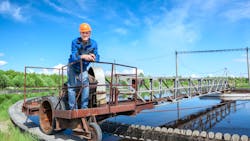Maine’s clean water workforce is one of the oldest in America
One of the biggest challenges in growing Maine’s economy is the aging workforce, according to a press release from the Maine Water Environment Association (MeWEA).
With 22% over the age of 65, more Mainers are expected to retire than enter the workforce creating the potential for a statewide labor shortage, according to Maine’s 10-Year Economic Development Strategy.
This problem is being felt acutely in Maine’s clean water industry where the average age of an operator is 56 — eight years older than the national average. The ‘silver tsunami’ has led to a 24% decline in the clean water workforce from 2015 to 2023, shrinking it from 850 water operators to 650.
“Without a sufficient workforce, the State of Maine will not be able to protect and preserve the clean water standards we’ve all come to expect,” said Emily Cole-Prescott, president of MeWEA, a state association of clean water industry professionals. “Our operators are critical to the daily preservation of public health — without the next generation stepping into these jobs, we will have a serious environmental crisis.”
In effort to stem the looming problem, the Maine Department of Environmental Protection (MEDEP), the governing body of Maine’s clean water industry, worked with MeWEA to make it more competitive for the industry to recruit a talented workforce. In 2024, one of MeWEA and MEDEP’s primary goals is to attract Maine veterans to careers in clean water because of the highly transferrable skillset developed during military service.
Veteran Travis Peaslee is now the general manager of the Lewiston Auburn Water Pollution Control Authority (LAWPCA), one of the largest clean water facilities in the state. He believes attracting veterans to the industry is critical to building the next generation of its workforce.
“The skills and discipline gained from a military career are highly transferrable to the front lines of public health,” Peaslee said.
In 2023, Peaslee worked with MEDEP to adjust workforce rules to allow veterans’ previous military experience to transfer to careers in Maine’s clean water industry. The rule change, which is now in effect, will enable veterans to leverage military experience to start above entry-level, advance starting salaries, and provide a more seamless licensing process.
Veteran and reservist Benjamin Pendleton was a Marine Science Technician in United States Coast Guard for sixteen years. Pendleton recently accepted a position within the Division of Water Quality Management at MEDEP and adds that “going from a career in military to water was a natural transition. Veterans possess the ability to interpret state and federal laws, and understand the urgency and quick decision-making needed in emergency situations – you need those skills in the water industry.”
“Careers in clean water provide a critical service to the health and safety of our people and our environment,” said Brian Kavanah, Director, Bureau of Water Quality, Maine DEP. Kavanah agreed that “the DEP’s incentive is a perfect fit for veterans to naturally extend their careers in public service.”
